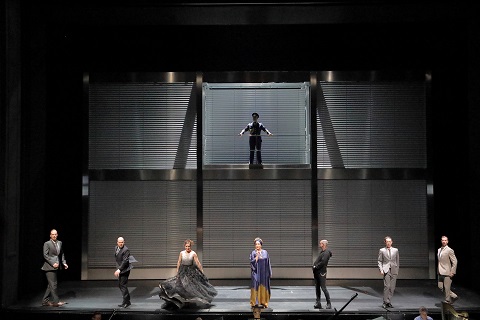That Agrippina tells us next to nothing about ancient Rome is neither here nor there. One might say the same of La clemenza di Tito (in whichever version one cares to take it). It benefits also, I think, from being one of Handel’s earliest works. The freshness of his Italian writing is often very much apparent, even though some of the music he recycles – his own, that is, though Reinhard Keiser puts in guest ‘borrowed’ appearances too – perhaps breathes more easily in its earlier manifestations. There is certainly wit in Cardinal Vincenzo Grimani’s libretto; that seems to have appealed to Barrie Kosky, who somewhat oddly speculates in the programme on the cardinal’s sexual orientation on the basis of in-jokes, as he sees them. Again, that is really neither here nor there, but Kosky, for all the intelligence with which he writes otherwise in that programme, seems unable or at least unwilling to prevent himself from inflicting acts of arbitrary silliness. They do little to clarify or to further the action, and serve instead to suggest that it is not to be taken seriously. (If not, then what is the point at all? It is certainly not an intrinsically amusing work.) Silly dancing, that plague of so much vaguely ‘modern’ opera staging, recurs with wearying regularity; likewise gratuitous over-acting, which serves, it seems, only to dare one ‘humourlessly’ to decry it. As for the bizarre transformation of Agrippina at one point into nightclub singer, the less said the better.
Alice Coote. Photo credit: W. Hoesl.
There is, moreover, little or no sense of what might actually be at stake in the plot, most notably the very real danger in which Ottone, fallen foul of imperial favour, finds himself. The work’s dramaturgical difficulties are thus heightened rather than addressed, let alone resolved. Deferring an interval until the middle of the second act does not really help. The three-act structure is clear and meaningful; there is no obvious reason to present us with one-and-a-half acts at a time, other perhaps than cost-cutting. The descent of Juno to bless the final arrangement is - somewhat oddly, given the length of the evening – omitted. So too is the ballet that would follow; instead, we have an aria from L’Allegro, Il Penseroso ed Il Moderato. That all does no harm, I suppose; presumably divine intervention stood at odds with whatever the production’s prevailing sensibility of the production is held to be. (Apart from vaguely modernised silliness, I remain at a loss.) Its inclusion might well, though, have offered opportunity for more of a critical, reflective stance than ever emerges.
Ivor Bolton’s tempi were sensible enough, at least for a while. It was not long, though, before one realised that the conductor had little or no sense of harmonic rhythm, and was simply treating the score as recitative-aria-recitative-aria, ad infinitum. Given some arbitrary pulling around of certain numbers, others remaining unpleasantly hard-driven, the work’s longueurs were again heightened rather than addressed. Orchestral playing was generally excellent, the Bavarian State Orchestra’s woodwind especially delectable. If strings would have benefited from warmer tone at time, that was clearly a consequence of Bolton’s allegedly ‘period’ style. Continuo exhibitionism was largely absent, for which, in the present climate, we should all be grateful, even though what remained was often somewhat staid.
Gianluca Buratto and Elsa Benoît. Photo credit: W. Hoesl.
There was much to admire in the singing, save for Franco Fagioli’s dreadful squawkathon as Nerone. His bizarre facial expressions were certainly matched by grotesque vocal production. Why anyone should wish to experience either is quite beyond me. The best that could be said was that his display was less atrocious than as Covent Garden’s Idamante a few years ago; at least he sang a few more of the right notes in Munich. Alice Coote offered a generous, beautifully shaded performance in the title role, coloratura a dramatic tool, rather than, as in Fagioli’s case, a mere object of (fallible) display. Elsa Benoît’s Poppea proved finely contrasted in tendency – Kosky’s more girlish conception of her was perhaps a little much – but possessing many of the same musical virtues. Oddly, the one aria in which accuracy of intonation left much to be desired was the one vigorously applauded by a sadly undiscerning audience. (It lapped up Fagioli too.) Iestyn Davies put Fagioli to shame in his unfailingly musical performance as Ottone. ‘Ti vuo’ giusta e non pietosa,’ which here came immediately before the interval, offered all the musical sensitivity and verbal acuity so conspicuously absent chez Nerone. There were otherwise no weak links, Gianluca Buratto’s Claudio perhaps especially impressive in his matching of style and temperament.
Ultimately, though, none of the problems seemingly inherent in performance of Handelian opera seria were solved; a good few were not even acknowledged. Handel is unquestionably a fine composer. Is it too much, though, to ask that we look more to the music – and indeed to the musical dramas – in which he stands at his greatest? Most of the oratorios – pretty much any of them, other than Messiah – remain bizarrely neglected. They offer thoughtful singers, as well as audiences, considerably greater nourishment, on the whole. And can we not at least rid ourselves of this fad with vocal exhibitionism, especially when it fails so manifestly even on its own terms? There is room for Handel and Gluck; a surfeit of the former, however, tends only to have one longing for the ‘noble simplicity’ of the latter.
Mark Berry
Handel: Agrippina
Claudio – Gianluca Buratto, Agrippina – Alice Coote, Nerone – Franco Fagioli, Poppea – Elsa Benoît, Ottone – Iestyn Davies, Pallante – Andrea Mastromi, Narciso – Eric Jurenas, Lesbo – Markus Suihkonen; Director - Barrie Kosky; Conductor – Ivor Bolton, Set Designs – Rebecca Ringst, Costumes – Klaus Bruns, Lighting – Joachim Klein, Dramaturgy – Nikolaus Stenitzer, Bavarian State Orchestra.
Prinzregententheater, Munich; Sunday 28th July 2019.
